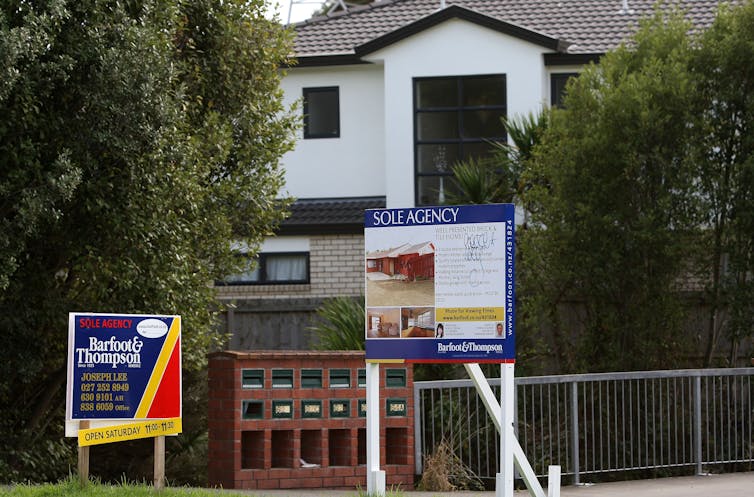364,000 New Zealanders rely on an accommodation supplement – but these 3 flaws need fixing
- Written by Wasay Majid, Research Assistant, University of Auckland, Waipapa Taumata Rau

New Zealand’s accommodation supplement scheme is facing scrutiny, with Social Development Minister Louise Upston recently saying[1] “there is merit in considering whether the current settings are fair and sustainable long-term”.
The means-tested[2] accommodation supplement is a weekly payment helping households with rent, board, or mortgage costs. Following a NZ Herald Official Information Act request, the government revealed[3] in the year to January 31 2024, it paid out NZ$2.34 billion to 364,000 renters and mortgage holders.
Yet despite rising rents and an increase in accommodation supplement recipients, government spending on the supplement actually decreased by $37 million last year. In fact, the scheme rarely exceeds[4] its annual budget.
And my own research[5] shows it’s become an important part of many New Zealanders’ household budgets. Government spending on the supplement directly affects people’s spending on food.
So before the government makes any significant changes, it is worth understanding how the accommodation supplement works now – and how the government could make it fairer.
How the accommodation supplement works
The accommodation supplement can be traced back to New Zealand’s welfare reforms in the early 1970s. In 1975, the Labour government of the day introduced the “additional benefit” – a supplementary allowance for housing costs and special expenses. This evolved into the “accommodation benefit” in 1981, which later became the accommodation supplement in 1993.
The accommodation supplement is calculated with a negative income tax formula[7]. So for eligible taxpayers earning below a specific income threshold, the supplement is a cash payment deposited directly into their bank account, allowing people to spend it as they see fit.
The payment can increase or decrease independently of rent and mortgage costs. If a recipient’s income, tax credits, other sources of income, or personal savings increase, supplement payments decrease – and vice versa. Annual revisions of the main benefit can also lower supplement payments. Simply put, the supplement functions as an income maintenance scheme.
Read more: NZ’s housing market drives inequality – why not just tax houses like any other income?[8]
Accommodation supplement eligibility is based on income and wealth levels of households, not rents or housing choices.
My own recent research[9] on the accommodation supplement has shown supplements do not distort the rental market by pushing up prices.
Current policy settings
Maximum payment settings for the accommodation supplement have been revised only twice since being set 1993. That is, clients’ payments can not exceed the maximum payment for years on end and essentially remain capped for around 13 years.
Current settings divide New Zealand into four geographical areas for rental payments, ranging from the most expensive (urban centres such as Auckland, for example) to the least expensive (rural communities). Even if the policy was revised to adjust payment settings annually to fairly reflect rent changes, compensation would not take into account local rent variations.
Read more: As NZ struggles to resolve its long-running housing crisis, investors should be taxed for keeping homes empty[10]
Capped maximum payments mean recipients depend on their income and not the supplement to cushion rent rises, keeping government spending on the supplement to around 0.5% of the gross domestic product.
Research from the United Kingdom[11] found reducing housing allowances does not lower rents, but may cause overcrowding. Whereas maintaining the supply of accommodation allowances[12] in the United States helps low-income households stay in their homes despite rent increases.
The flaws in the system
If the government wanted to make accommodation supplement work better to help the 364,000 renters and mortgage holders who rely on it today, there are three key issues it needs to address.
The supplement does not provide relief proportionate to market rents and housing affordability. Rents have increased, but the accommodation supplement has not.
Means and asset testing disqualifies couples from the supplement if they have cash assets exceeding $16,200 (for singles, the limit is $8,100). This is 1.75% of today’s median house price, restricting a couple’s ability to save for a mortgage deposit while receiving the supplement. This limit was around 17% of the median house price when it was last adjusted in 1988.
Finally, the supplement has a mixed impact on recipients. It allows homeowners accessing the supplement to build housing equity, while renters can’t accumulate enough for a home deposit, widening wealth disparities. The supplement also benefits banks as they can use supplement eligibility to assess mortgage applicants.
Widely recognised as a measure to address rising rental costs, the accommodation supplement needs to be more responsive to changes in rental expenses.
Rather than scrapping the supplement, or reducing the number of people who receive it, changes can be made to ensure the policy is more effective in helping New Zealanders with housing during the current cost-of-living crisis.
References
- ^ saying (www.nzherald.co.nz)
- ^ means-tested (www.nber.org)
- ^ revealed (www.nzherald.co.nz)
- ^ rarely exceeds (researchspace.auckland.ac.nz)
- ^ my own research (researchspace.auckland.ac.nz)
- ^ Sandra Mu/Getty Images (www.gettyimages.com.au)
- ^ negative income tax formula (www.tandfonline.com)
- ^ NZ’s housing market drives inequality – why not just tax houses like any other income? (theconversation.com)
- ^ recent research (papers.ssrn.com)
- ^ As NZ struggles to resolve its long-running housing crisis, investors should be taxed for keeping homes empty (theconversation.com)
- ^ Research from the United Kingdom (www.tandfonline.com)
- ^ maintaining the supply of accommodation allowances (gerardtorratsespinosa.com)

















